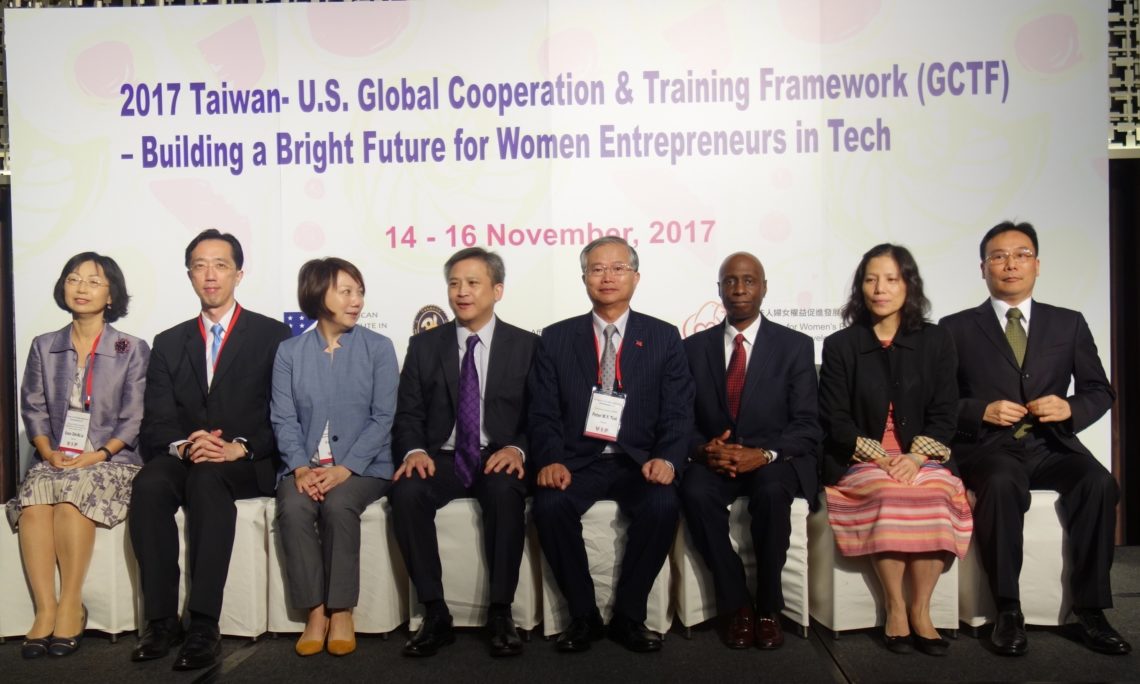Opening Ceremony of Global Cooperation and Training Framework (GCTF) Workshop:
Building a Bright Future for Women Entrepreneurs in Tech
November 14, 2017
AIT Official Text #: OT-1721
(As Prepared for Delivery)
Secretary General Tsai, Ambassador-at-Large for Women’s Empowerment Fan, Deputy Assistant Administrator Cornelius, CEO Chien, ladies and gentlemen, good morning!
It is a real pleasure to be here today to help kick off this important training. I am pleased to see so many people from around the region, both from government and from the private sector in attendance. The reality is that in today’s digital age, technology entrepreneurship knows no borders, and it is only by working closely together that we can usher in an inclusive digital society.
And let’s be frank: so far, technology entrepreneurship has been dominated by men – men who it appears have a single driving motivation. As a market observer once famously quipped, “San Francisco tech culture is focused on solving one problem: what is my mother no longer doing for me?”
More seriously, tech culture has not always been open and receptive to women. Quite the opposite, women’s experience has often been characterized by exclusion, hostility, and sexual harassment.
The United Nations, the World Bank, and many development economists have come to one simple conclusion: the most effective way to promote inclusive growth and development is to empower female entrepreneurs. The logic for this is very clear. First, an economy cannot grow if only half of its population is contributing to the economy. Second, female entrepreneurs tend to spend relatively more of their profits on growth-enhancing investments, such as education, health care, and better food for their children. And third, we need a diversity of entrepreneurs if we seek to solve the diversity of society’s problems.
The internet provides an unparalleled opportunity for every female entrepreneur, even those selling baskets in remote villages, to become the head of a multinational corporation. The combination of digital platforms and women tech entrepreneur empowerment has the potential to lift millions of women out of poverty and change the culture of our tech businesses in positive ways all while bringing much needed goods and services to consumers around the world.
This training is, in many ways, occurring at the intersection of three foreign policy goals of the United States.
First, the United States remains committed to promoting female entrepreneurship around the world, and this is an important policy goal of the United States. In this context, at the end of this month in Hyderabad, India, Ivanka Trump and Prime Minister Modi will be co-hosting the Global Entrepreneurship Summit whose theme is promoting women’s entrepreneurship. We have nominated and are supporting the participation of four Taiwan female entrepreneurs at the summit, the highest per capita participation of any economy in Asia.
Second, we fundamentally believe Taiwan has a tremendous amount of experience and leadership to share in this area, and we are determined to help the world learn from Taiwan’s expertise in a wide variety of areas through the Global Cooperation and Training Framework. Taiwan is in many ways at the leading edge of women’s empowerment and technology entrepreneurship. It is clear looking at the training program you will get a good taste for this. Taiwan recently elected its first female president, it is a leader in LGBT rights in Asia, and it has been at the forefront of technology innovation for decades.
Finally, the United States has for decades pursued cooperation with Taiwan in the technology sector. Through the AIT-TECRO Digital Economy Forum, which we launched two years ago with Taiwan, we are working hard to bring our economic relationship into the digital age. Digital economy cooperation has quickly become a central pillar of the U.S.-Taiwan economic relationship. It is only by getting both the public and private sector together in the same room around a common theme – as we are doing today – that we can develop solutions that will work for all of society.
My hope is all of you leave this training with at least two key takeaways. First, I hope you go home equipped with new tools and ideas for how you can promote women technology entrepreneurship in your home countries. And second, I hope you go home with a feeling that all of you are the future ambassadors of women’s technology entrepreneurship for the region. Keep in contact with one another, share your experiences – both your successes and the lessons learned from your failures. The best sign of success of this training is actually what comes next – how all of you will continue to work together to advance this common cause.
Once again, I thank all of you for coming. I thank Taiwan’s Ministry of Foreign Affairs for our continued close cooperation in organizing these trainings, the Foundation for Women’s Rights Promotion and Development for implementing this workshop, and our American guest speakers for coming all this way.
Enjoy the training!
















![Video Thumbnail [Recovered]-01](../wp-content/uploads/sites/269/Video-Thumbnail-Recovered-01-1-750x450.jpg)






